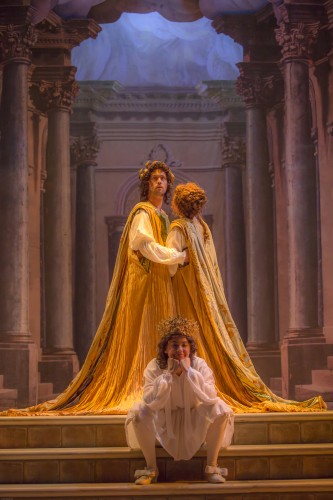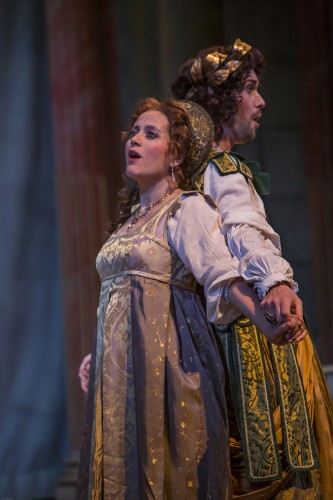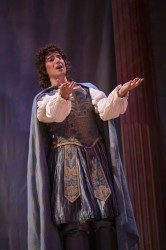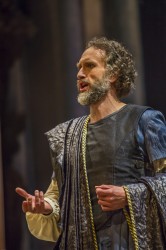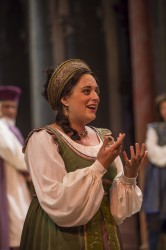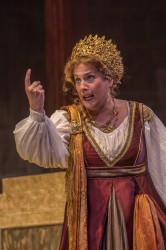Concert Review: More Masterly Monteverdi from the Boston Early Music Festival
The Boston Early Music Festival’s production of Monteverdi’s final opera, L’incoronazione di Poppea, is not to be missed—that is, if you can get a ticket.
By Susan Miron
The second of the three Monteverdi operas being performed this week during the 2015 Boston Early Music Festival is another triumph. L’incoronazione di Poppea, Monteverdi’s last opera, opened to an enthused capacity audience on Tuesday night at the BU Huntington Theater (it will be repeated Sunday, June 14, at 3:30 p.m.). Like Il Ritorno d’Ulisse in Patria (Monteverdi’s other Venetian opera, written three years earlier), Poppea is concerned with the nature of love and desire as forces determining good and evil. However, the love duets sung at the end of both operas couldn’t be sung by two more different couples. Ulisse celebrates the reunion of a long-separated, devoted married couple, while Poppea‘s newly married couple has had all their foes — that is, the opera’s good guys — eliminated. This is one scary set of newlyweds, but they sing so fabulously well, we try to overlook their larger-than-life malefactions.
Venetians were intensely fascinated with Roman subject matter, perhaps because they considered themselves the direct descendants of classical Roman civilization. Poppea is based on the true story of the Roman emperor Nero’s lust for a noblewoman, Poppea Sabina, and dramatizes events that occurred between 58 and 65 A.D. Its libretto, by the brilliant Giovanni Francesco Busenello (1598-1659), is culled from several sources, including the Annals of Tacitus; Seutonius’s The Twelve Caesars, Book 6; and Dio Cassius’s Roman History. Both Ulisse (1640) and Poppea (1643) were premiered at the Teatro Santi Giovanni e Paolo in Venice.
Poppea‘s world is one whose important characters are ethically compromised, amoral, and—despite their beautiful voices—generally despicable. The sexually manipulative Poppea is played to perfection by Boston favorite soprano Amanda Forsythe, whose costume, posture, makeup, and singing send shivers through one’s spine. BEMF made the decision to give her and her lover Nerone (David Hansen) the chance to become more familiar with each other at a concert of arias from Poppea and Handel in April—and the session paid off. It seems as if the two had acted, sung, and lusted after each other for ages before the curtain went up. The wildly talented Australian countertenor David Hansen, who seethed with manic energy and ethical confusion, was great fun to watch—and to hear. He makes that age-old promise to marry his girlfriend and crown her empress as soon as he dumps his wife Ottavia, sung with flair by Shannon Mercer. (Here, for once, is a guy who makes good on his oath!) Nerone is putty in Poppea’s hands. Even the gods get out of the way of this nasty couple, who have most of the rest of the characters killed or sent into exile. Hansen steals the show every time he sings his impossibly difficult lines, which includes some of the most fantastic coloratura I have ever heard from a countertenor.
At the opera’s opening, two white-clad statues are standing motionless on pedestals—La Fortuna and La Virtú (Erica Schuller and Danielle Reutter-Harrah)—bearing a close resemblance, until they begin to sing, to those painted humans who comically if uncannily pose as statues in Barcelona. They debate issues of power, but are interrupted by Amore/Cupid, the god of Love (Nell Snaidas, who throughout the opera proffers plenty of energetic charisma), who asserts he is the most powerful deity of all of them, and will prove it.
Here, for those who who like complicated plots explicated, are Ellen Hargis’s pithy program notes:
“Ottone [Nathan Medley], Poppea’s long-time lover, returns after a long absence to find her having an affair with Emperor Nerone. Nerone has promised that as soon as he can rid himself of his wife, Empress Ottavia, he will marry Poppea and put her on the throne. The Emperor ignores the advice of his tutor Seneca [sung memorably by Christian Immler, whom the audience adored], who has tried to dissuade him, and Nerone orders him to commit suicide.
“Ottavia plots to have Ottone kill Poppea. Drusilla [Teresa Wakim, as always, full of charm and in beautiful voice], who loves Ottone, helps disguise him with her own clothing. Amore intervenes, the plot is foiled, and Drusilla is accused of the crime. When Ottavia is revealed as the perpetrator, Ottone asks to be exiled together with Drusilla, whom he realizes he loves. Ottavia is banished from the realm, and Poppea is crowned Empress of Rome.”
There are several moving duets sung beautifully by two soldiers and, later, two consuls (Aaron Sheehan, who will play the title role of Orfeo on Saturday) and Zachary Wilder (who made a strong impression in Ulisse). Two other standouts in the production were Arnalta (Laura Pudwell), the old nurse and confidant of Poppea, and Nutrice (José Lemos), who took on the role of the nurse of Empress Ottavia. Anna Watkins’ costumes designs were both elegant and fun. Stage Director Gilbert Blin did his usual impressive job.
As outstanding as the cast of singers were, so were the plucked strings and harpsichord of the Boston Early Music Festival Chamber Ensemble. The Ensemble’s co-directors Stephen Stubbs (chitarrone & Baroque guitar) and Paul O’Dette (chitarrone), along with the gifted Baroque harpist Maxine Eilander, performed almost continuously and the ensemble never sounded less than inspired. For those who enjoy harp, it was an extraordinary evening.
Susan Miron, a harpist, has been a book reviewer for over 20 years for a large variety of literary publications and newspapers. Her fields of expertise were East and Central European, Irish, and Israeli literature. Susan covers classical music for The Arts Fuse and The Boston Musical Intelligencer. She is part of the Celtic harp and storytelling duo A Bard’s Feast with renowned storyteller Norah Dooley and, until recently, played the Celtic harp at the Cancer Center at Newton Wellesley Hospital.
Tagged: Boston Early Music Festival, Claudio Monteverdi

